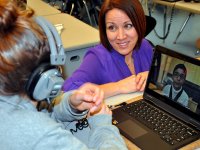Creating Meaningful Global Connections
U.S. middle-school students became video pen pals with their Pakistani counterparts, acquiring real-world communication skills, enhanced cultural perspective, and an awareness of their leadership skills.
Your content has been saved!
Go to My Saved Content.Eyes lit up when I mentioned pen pals. Their eyes grew wider when I explained that we wouldn't be using paper, and the coolest part was how excited they became when they learned that they would be connecting with pen pals from the same country as Malala. This enthusiasm, combined with cutting-edge technology, transformed my multicultural literature unit this fall.
After reading I Am Malala by Malala Yousafzai, my students collaborated one-on-one with middle-school peers at an independent school in Karachi, Pakistan via video message exchange. They explored themes such as cultural stereotypes, common misconceptions, leadership and role models, access to education, community service, and life in both Pakistan and the United States.
3 Benefits
The goal of the program was for students to create meaningful connections with peers from a different culture and develop a better understanding about the world. Facilitated by Level Up Village, this cultural exchange allowed my students to not just discuss empathy, but also put it into action. Here are three reasons why all language arts teachers should consider integrating global collaboration into their classroom:
1. Students develop empathy through interaction.
Communicating virtually with students in Pakistan provided my students with the extraordinary opportunity to develop empathy through real-world interaction. The technology was the easy part -- they intuitively understood how to navigate Level Up Village's global communication platform, and it was a natural extension of our district's 1:1 digital learning environment.
But before they logged on to send their first message to their partners in Pakistan, we engaged in a series of pre-discussions regarding culture and empathy to set the stage for their interactions with their global partners. I was then able to build on their prior knowledge and use teachable moments during the exchange to maintain sensitivity regarding issues such as terrorism and access to education.
Moreover, they learned that since Malala is a polarizing political figure in Pakistan, their global partners would not have access to the book nor be able to discuss Malala herself. But students on both ends of the exchange were prepared to discuss the important themes that Malala raises. One is the unequal access to education in Pakistan. While my students had read about it in the book, it became more real when they realized that their partners were among the fortunate ones who got to go to school.
Another important skill they acquired was learning how to phrase questions and elicit responses from their partners to foster the relationship and make the videos come alive. Using what we learned about empathy, students practiced phrasing and delivery until they created effective open-ended questions.
2. Video exchange taps into different learning styles.
The exchange of video messages provided a new vehicle of expression for my students that went beyond the reading, writing, and group work typical in their day-to-day lives. This mode of communicating tapped into their different learning styles, sometimes in surprising ways.
My more outgoing, spontaneous students jumped right in. They started recording immediately and found the project quite stimulating. But even more remarkable was how some of my more introverted students gained a voice through the one-to-one exchange. These students felt more comfortable writing a script first, then recording, and were among the most reflective as the relationship with their partners evolved.
Over the course of the exchange, all of my students talked in depth about their culture, their interests, how they help their communities, who their role models were, and how they viewed themselves as leaders. Their personalities really shined through, and as a result, I saw different facets of their identities that might not ordinarily surface in class. This knowledge will inform and shape what I do in my classroom for the rest of the year.
3. Global collaboration gives students a new audience.
The Level Up Village video exchange also gave my students a new audience for their ideas and opinions, which is quite validating for young people. This wasn't just another assignment for their teacher or a presentation for their classmates. Instead, they were communicating with someone more than 7,000 miles away, and while that pushed them out of their comfort zone, it also inspired them to tackle tough topics and keep in mind that their partner may have an entirely different perspective.
Additionally, through using this innovative technology, I saw my students immediately apply their classroom learning to the outside world. I didn't have to wonder if their knowledge and appreciation of a new culture would stick with them to use at a later time. I didn't have to wonder if they would remember how to ask effective questions when interacting with others outside of class. Instead, their new learning was reinforced during their next conversation with their global partners. This valuable practice is something that will serve them well whenever they meet new people, even here at home.
Students Reflect
By integrating global communication into my language arts classroom, I helped my students acquire real-world communication skills, an enhanced cultural perspective, and a deeper understanding of who they are as leaders. More importantly, they realized that even though their personal circumstances were different, they shared much in common with their Pakistani partners. Here are some of their reflections on the experience:
Their responses to the experience exceeded my expectations and underscored the incredible impact of these one-on-one global interactions. The impact was growth that could not be measured by grades or standardized test scores. It was the cultivation of character embedded in a real-world experience, and that's worth doing.
